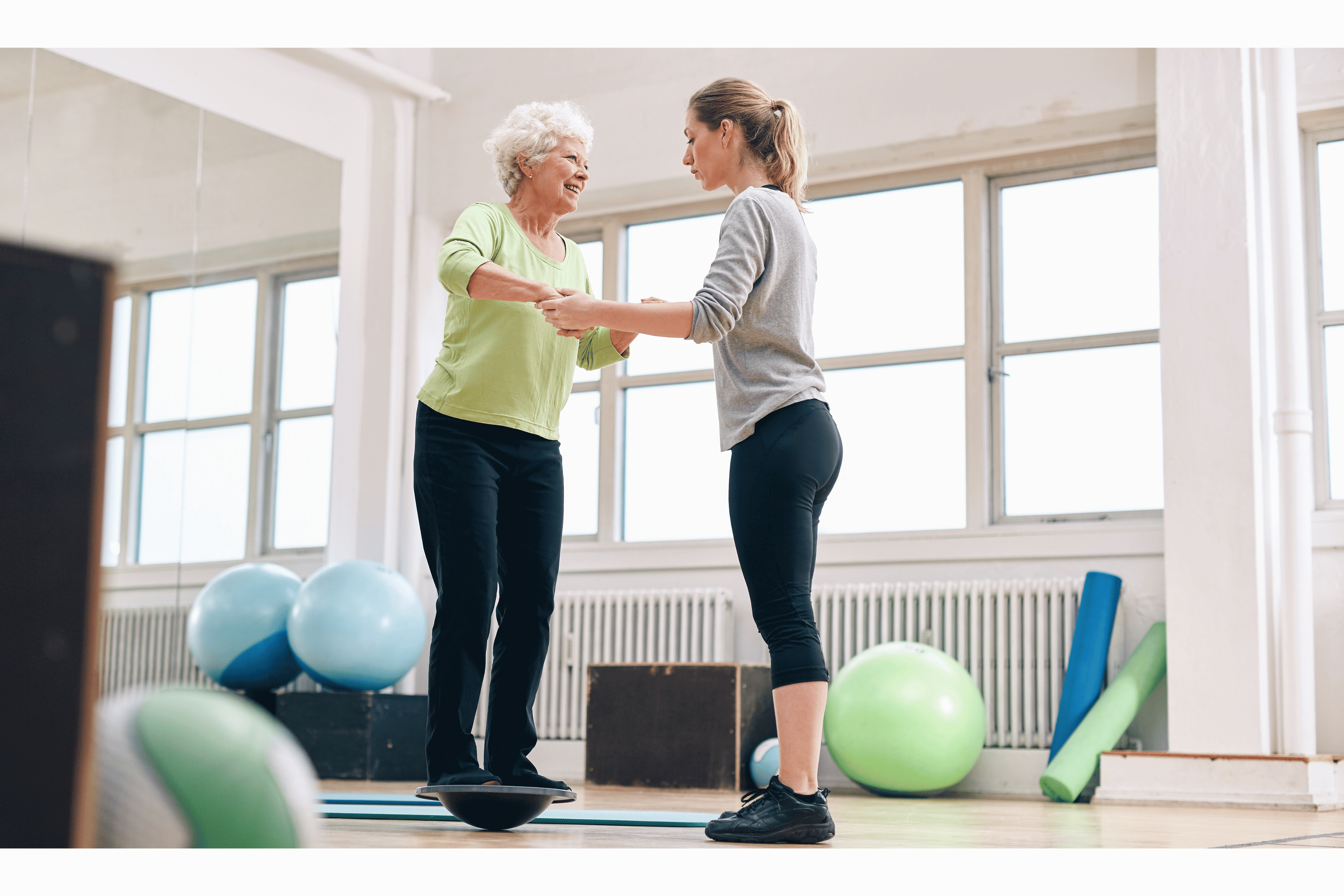We would always recommend a medical assessment prior to starting a rehabilitation programme to identify any medical cause for a fall and/or loss of balance.
Strength Training - Following assessment of your muscle strength, joint range of movement and function, we can provide an individualised programme that not only builds muscle strength and improves flexibility, but also builds bone strength and density. Both muscle strength and increased bone density can reduce the risk of injury if you do fall.
You may benefit from accessing our PFit service or as exercising as part of an online Neurofit group.
Balance Training- having assessed your balance, we will identify key factors that will form the basis of your balance training, often alongside the strength training programme. This may include vestibular rehabilitation and use of the AlterG and the Litegait to challenge balance in a de-weighted and supported environment.
Coping strategies – We can plan and discuss and practice what to do if you were to fall. These may include techniques to safely get up from the floor and how to stay safe whilst waiting for help.
Occupational Therapy – We have access to specialised Occupational Therapists who would be able to assess the home environment to ensure the risk of falls is reduced and identify any adaptations around the home environment such as rails and ramps which may help your mobility.
Review of walking aids - Our experienced therapists will be able to advise on assisted equipment to aid your walking such as modifications to your current walking aid or exploring other mobility options that may be more suitable.
Remain calm.
If you are not hurt, and you feel able to, you can try to slowly get up. Take your time with this:
Manage your health conditions and medicines.
Ensure you are having regular health reviews with your GP and medical teams to ensure your medical conditions are optimally managed. You should have regular medication reviews, at least once a year with your GP, and if you experience any side effects such as dizziness, please ensure your GP is aware of these in case changes to your medications are required.
Keep hydrated.
Ensure you are keeping hydrated, as dehydration can cause dizziness and increase your risk of falls. You should aim to drink 6-8 glasses of fluid a day unless advised not to by a health professional. This fluid does not just have to be water, it can include tea, coffee, and low sugar/sugar free squash as well. Caffeine is a mild form of diuretic, therefore try to keep caffeinated drinks to a minimum, ideally less than 4 a day.
Get regular eye tests.
It is important to take care of your eyes and your eyesight to reduce your risk of falls. An aspect of maintaining good balance relies on adequate eyesight. You should get your eyes tested at least every 2 years to ensure your eyes are healthy and your prescription is up to date.
Investigate any hearing problems.
As well as your eyesight, your hearing is another essential aspect of maintaining balance. If you notice any changes to your hearing, ensure you go to your GP as soon as possible to have this investigated further. It could be as simple as a build up of ear wax or an ear infection or you may need to be referred for a hearing test.
Optimise good bone health.
Having strong bones will reduce your risk of falls as well as reduce the risk of injury post fall. Regular exercise and having adequate levels of Calcium and Vitamin D in your diet will help to keep your bones strong.
Foot health and footwear
If you have problems with your feet, you are at a higher risk of tripping or falling. Any changes to sensation or pain in your feet should be reported to your GP and ensure your toenails are kept short. Another common presentation with many neurological conditions is foot drop/ drop foot. This can impact balance and increase the risk of falls by tripping over. For more information on foot drop/drop foot and how PhysioFunction can help with this, please click here. Foot.Drop.Solutions.at.PhysioFunction
As well as maintaining good foot health, the footwear you use is also important when it comes to falls prevention. If you are at risk of falls, you should avoid wearing high heels, open toe shoes and shoes without a back to them. Ideal footwear should have low heels with support around the sides, thin soles and good grip. Slippers for around the house should be fitted around your feet and not be slip-on, with good grip on the bottom. You should avoid walking around the house in socks and tights.
Environment
Many falls occur in the home environment, it is therefore important to reduce this risk as much as possible. This can be done by:
When walking outdoors it is also important to be aware of the environment around you. To reduce your risk of falls outdoors consider the following:
Our Physiotherapists can assess and provide a treatment program which can help minimise your falls risk.
Some of the key interventions are:
Start your journey and improve your independence with PhysioFunction. Contact us to book in a consultation with one our Neuro Specialists.
